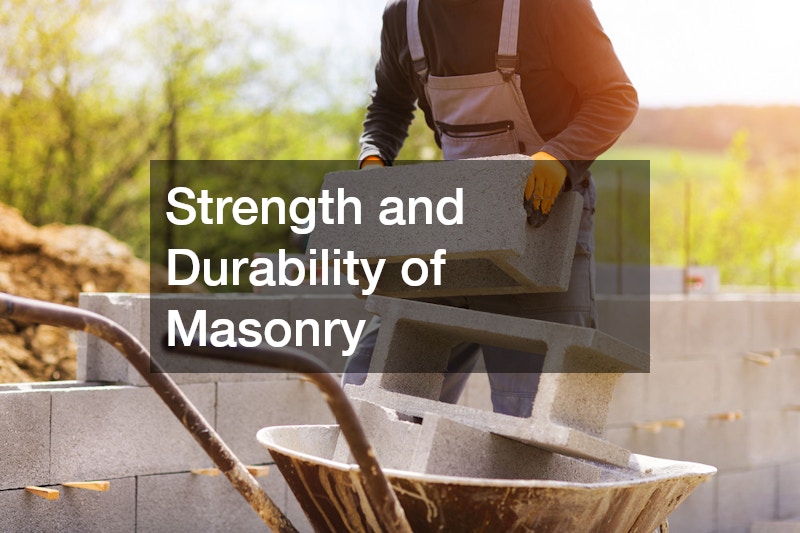Masonry is one of the oldest and most enduring construction techniques known to humanity. It involves the building of structures from individual units, typically stone, brick, or concrete blocks, bound together by mortar. This method has been used for thousands of years to create everything from ancient monuments to modern homes and commercial buildings.
Despite its age, masonry remains a vital part of construction today, valued for its strength, durability, and aesthetic appeal. This article explores what masonry is and why it is an important choice for many building projects.
What Is Masonry?
At its core, masonry is a construction process that joins together natural or manufactured materials into a cohesive structure. The main components include bricks, stones, concrete blocks, or other masonry units, and mortar, which acts as the binding agent. The materials are carefully laid in patterns or courses to create walls, floors, columns, and other structural or decorative elements.
There are different types of masonry depending on the materials used and the techniques applied. For example:
-
Brick Masonry: Uses clay bricks, typically rectangular, which are laid in various patterns.
-
Stone Masonry: Employs natural stones, either cut to shape or used in their natural form.
-
Concrete Block Masonry: Utilizes larger, manufactured concrete blocks that provide structural strength.
Masonry can be load-bearing, supporting the weight of a building, or non-load-bearing, serving as a decorative or partition wall. The versatility of masonry means it can be adapted to a wide range of architectural styles and structural needs.
The Strength and Durability of Masonry
One of the most significant reasons masonry has endured for centuries is its exceptional strength. When done properly, masonry structures are remarkably robust, capable of withstanding heavy loads and harsh environmental conditions. This strength is a result of both the materials used and the way they are assembled.
For instance, stone masonry uses dense natural stones that are inherently strong and resistant to weathering. Brick masonry, when laid with quality mortar and proper techniques, creates walls that resist cracking and degradation over time. Concrete block masonry is favored for its uniformity and compressive strength.
In addition to strength, masonry is highly durable. Masonry walls can last for hundreds of years with minimal maintenance. They are resistant to fire, pests like termites, and rot, making them a safer and longer-lasting choice compared to some other building materials such as wood. This durability translates into fewer repairs and less frequent replacement, which benefits building owners in the long term.
Masonry’s Insulating Properties
Another important benefit of masonry is its natural ability to insulate. Masonry materials have a high thermal mass, meaning they absorb and slowly release heat. This characteristic helps to regulate indoor temperatures, keeping buildings cooler in the summer and warmer in the winter. The result is a more comfortable living or working environment.
Because masonry walls slow the transfer of heat, they can contribute to energy efficiency by reducing the demand for heating and cooling systems. This makes masonry an environmentally friendly choice and can improve the overall sustainability of a building.
Aesthetic Appeal and Design Flexibility
Masonry is also prized for its aesthetic qualities. The wide variety of materials, textures, and colors available means that masonry can be tailored to suit nearly any architectural vision. From classic red brick to elegant natural stone and modern concrete finishes, masonry offers endless design possibilities.
Masonry can be used to create intricate patterns, detailed facades, and beautiful accents. It is often chosen to add character, charm, and a timeless quality to buildings. In both residential and commercial construction, masonry can enhance curb appeal and increase the perceived value of a property.
Moreover, masonry works well with other building materials, allowing for mixed designs that combine wood, metal, glass, and masonry in innovative ways.
Masonry’s Role in Structural Integrity
Beyond looks, masonry contributes significantly to a building’s structural integrity. Masonry walls provide stability and rigidity, helping structures resist lateral forces such as wind and earthquakes. The weight and mass of masonry can also provide sound insulation, reducing noise transmission between rooms or from outside.
In some regions, masonry is essential for building codes due to its resilience against natural disasters. Its fire-resistant qualities also provide extra safety in both residential and commercial settings.
Why You Need Masonry
Choosing masonry for your construction project offers numerous benefits:
-
Longevity: Masonry structures stand the test of time, maintaining their strength and appearance for decades or even centuries.
-
Low Maintenance: Masonry requires minimal upkeep compared to other materials, saving effort and resources over the life of a building.
-
Safety: Fire resistance, pest resistance, and structural stability make masonry a safer choice for occupants.
-
Energy Efficiency: Masonry’s thermal mass helps regulate indoor temperatures naturally, contributing to energy savings.
-
Aesthetic Versatility: Whether you want a traditional, rustic look or a modern, sleek facade, masonry can be adapted to meet your design goals.
-
Sound Insulation: The density of masonry materials helps block unwanted noise, creating quieter interior spaces.
-
Resilience: Masonry walls can endure harsh weather conditions, including strong winds, heavy rain, and temperature extremes.
Given these advantages, masonry is an excellent choice for building homes, commercial buildings, retaining walls, chimneys, and much more. Whether you are constructing a new property or looking to renovate an existing one, masonry offers lasting quality and dependable performance.
Masonry is a timeless construction method with a proven record of strength, durability, and beauty. Its ability to create solid, fire-resistant, and energy-efficient structures makes it a valuable choice for any building project. Beyond its functional benefits, masonry also provides unmatched aesthetic flexibility, allowing buildings to stand out with unique style and character.
When selecting materials and construction methods, considering masonry ensures you invest in a solution that will protect your property, enhance its appearance, and provide comfort for years to come. Whether building a home, commercial space, or decorative feature, masonry remains a smart, reliable, and essential option in construction today.




